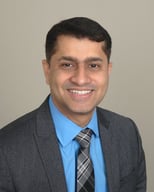Bridging the Medical-Dental Divide Through Integration

Imagine: When you visit your dentist for a cleaning, they start the visit by checking your chart, which includes your full medical history. They notice that you’re on medication that can cause dry mouth, so they ensure that you understand what that means and how to lessen the impact. They also check your blood pressure, and when it seems a little high, they make a note on your chart and flag it for your primary care doctor—who also happens to be down the hall. Your dentist tells you that after your cleaning, your primary care doctor will be available to discuss options for blood pressure management.
This whole-person approach to care can save money, time and lives—and we can achieve it through medical-dental integration.
Integration is an approach to care that integrates and coordinates primary care, dental care, behavioral health and other modalities to support individual—and population—health. Instead of a single provider looking at one part of the body, or just one symptom, an entire care team evaluates and treats the whole person.
Take oral and overall health. When there’s something wrong in your mouth, it can have a negative impact on the rest of your body—and vice versa. For example, there is a known link between gum and heart disease, so treating patients for gum disease may help prevent or lessen the impact of future heart disease. But often when we visit a dentist or our primary care physician, neither provider talks to the other. They don’t share electronic medical records. They don’t develop a treatment plan together. As a result, crucial opportunities for better care are being missed.
When integration is working well, the care team works to create a unique, comprehensive care plan for each person. Together. Medical-dental integration helps support a payment model that rewards positive patient outcomes, such as helping a patient control their diabetes, versus fees for every visits, test and service. We call this approach “value-based care,” and it has the power to transform the wellbeing of entire populations.
However, the U.S. health-care system isn’t really set up to accommodate it—with a few exceptions. Federally Qualified Health Centers (aka community health centers) are federally funded health care organizations located in underserved areas where people have been systemically disadvantaged or don’t have access to enough providers. Charged to provide care to everyone, regardless of who they are, where they come from or their ability to pay, every community health center offers primary care, dental, behavioral health, pharmacy, access to social services and more—often under one roof. By having providers in the same location, staff can collaborate behind the scenes, offer warm hand offs for other services and create programs for better coordination of care.
The Michigan Initiative for Maternal and Infant Oral Health (MIMIOH) project, funded by the Michigan Department of Health and Human Services and the Delta Dental Foundation, is one such program. The project started when Michigan Primary Care Association and University of Detroit Mercy School of Dentistry noticed that data showed pregnant people on Medicaid were not obtaining dental care. Being pregnant can increase your risk for periodontal disease, which can cause adverse pregnancy outcomes, including preterm delivery, preeclampsia and low birth weight.
But that’s just one project. To make integration a reality everywhere, we need the space in clinics to allow for multidisciplinary care, streamlined technology and staff training to encourage effective collaboration. We need to look beyond the traditional health care and create truly comprehensive care plans that resolve the social determinants patients are facing, such as food and housing insecurity.
Integration can challenge barriers to care—lack of transportation, access to care, long wait times and finding child care—that have existed for many systemically disadvantaged people and populations. By eliminating the silos care occurs in now, we can make it easier for patients—and our communities—to take control of their health.
 Dr. Faiyaz Syed, MPH, is the chief medical officer for Michigan Primary Care Association (MPCA). In this role, Dr. Syed utilizes the requisite clinical experience and public health education to rely on, plan and accomplish the programmatic goals of MPCA. He also directs Michigan Quality Improvement Network (MQIN)—the Health Center Controlled Network for Michigan, a program that helps health centers achieve quality improvement enabled by health information technology. He is a strong advocate for public health policies and procedures, including medical-dental integration, in the fight against chronic diseases. He is an active member of multiple local and national leadership committees and boards, including the Delta Dental Foundation's, focused on clinical initiatives. Dr. Syed received his medical degree from Donetsk State Medical University, master's in public health from Michigan State University, and fellowship in community health policy and leadership from George Washington University. He is an avid Spartan sports fan and enjoys following international, college and professional league sports.
Dr. Faiyaz Syed, MPH, is the chief medical officer for Michigan Primary Care Association (MPCA). In this role, Dr. Syed utilizes the requisite clinical experience and public health education to rely on, plan and accomplish the programmatic goals of MPCA. He also directs Michigan Quality Improvement Network (MQIN)—the Health Center Controlled Network for Michigan, a program that helps health centers achieve quality improvement enabled by health information technology. He is a strong advocate for public health policies and procedures, including medical-dental integration, in the fight against chronic diseases. He is an active member of multiple local and national leadership committees and boards, including the Delta Dental Foundation's, focused on clinical initiatives. Dr. Syed received his medical degree from Donetsk State Medical University, master's in public health from Michigan State University, and fellowship in community health policy and leadership from George Washington University. He is an avid Spartan sports fan and enjoys following international, college and professional league sports.
